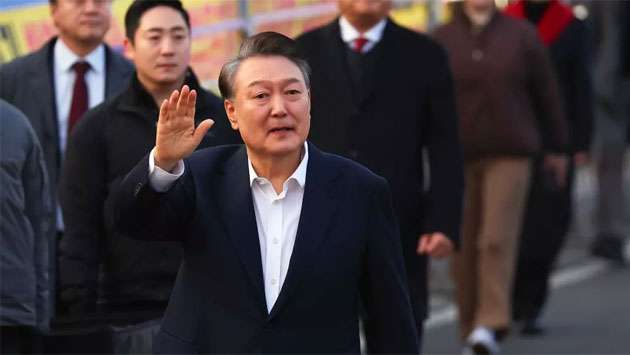South Korean President Yoon Suk-yeol, who declared martial law in December after special forces stormed the National Assembly and National Election Commission, was officially removed from office on Friday after the country’s Constitutional Court voted to uphold the impeachment motion passed by lawmakers late last year.
The court’s 8-0 ruling means South Korea will hold elections to choose a new president within 60 days. Separately, Yoon, 64, is also being tried on criminal sedition charges.
Yoon, who has served half of a five-year single-term term, is the second South Korean president to be impeached. Another conservative, Park Geun-hye, was removed from office in 2017 after a corruption scandal.
The court ruling marks the end of a tumultuous presidency.
Yoon was elected in 2022, defeating his liberal opponent, Lee Jae-myung, by 0.73 percentage points, or 247,077 votes. He began his term on what many saw as a weak popular mandate.
While Yoon was hailed by the Biden administration for bringing South Korea into a three-way military pact with Japan, aligning it with the broader U.S. push to limit China’s ambitions in the region, his past record of scandals, diplomatic blunders, and flashes of authoritarian rule made him deeply unpopular at home.
During his tenure, Yoon and his colleagues were criticized for trying to silence opposition media outlets and journalists, as well as for a government-funded cartoon contest that awarded its top prize to a work that insulted Yoon.
As part of his martial law decree, Yoon banned all political activity and placed the media under military control.
His wife, Kim Kyong-hee, has been dogged by her own controversies, including revelations that she plagiarized her master’s thesis.
Yoon has been unmoved during his impeachment trial, claiming that his political enemies have framed him for a rebellion — and that his declaration of martial law was intended as a plea for public attention.
Since December, members of the liberal opposition party — which holds 192 of the 300 seats in the legislature — have sought to justify his declaration of martial law by accusing North Korean sympathizers of using their “legislative tyranny” to undermine his government. It is an echo of the anti-communist rhetoric that past military dictators and later conservative leaders have frequently used against South Korean liberals, who have long been defined by their support for rapprochement with Pyongyang.
In defending his decision to deploy troops to the Election Commission, Yoon cited a widely debunked conspiracy theory that his conservative People’s Power Party suffered a crushing defeat at the hands of the Liberals in last year’s general election and was crippled by voter fraud.
“The purpose of declaring martial law on December 3 was to announce that the country was currently facing an existential crisis and to make a desperate appeal to the public to be aware of this situation and lend their support to overcome it,” Yoon told the Constitutional Court in early March.
But in testimony to the court and prosecutors, many military and government officials under Yoon’s command contradicted his version of events, recalling orders to arrest Yoon’s political opponents — and to prevent the National Assembly from exercising its constitutionally guaranteed right to lift martial law in a vote just hours after the president’s announcement.





